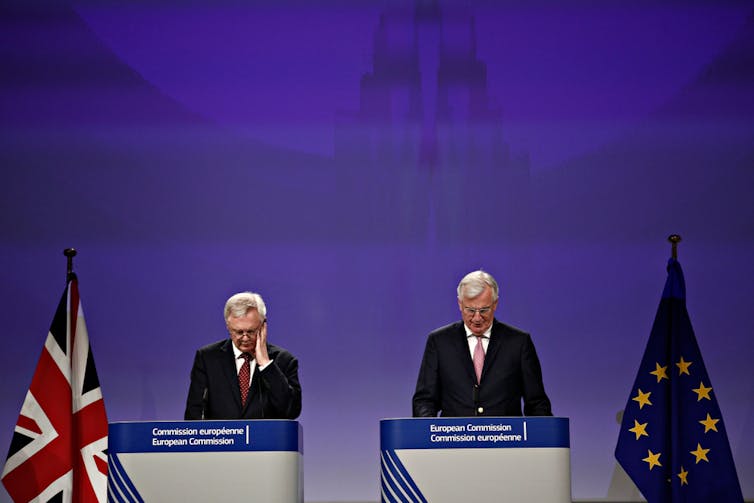At a party, the host arranges the guests in a circle and sticks a post-it note onto each of their foreheads. Each guest can see what’s written on everyone else’s post-it, but not their own.
“You are all Brexit negotiators,” says the host. “Some of you are representing the UK and some the EU, but all of you are negotiating for one or the other and there will be at least one negotiator for each side. The side you are representing is now written on your forehead. UK or EU – does anyone know which they are representing?”
Everyone shakes their head and says they don’t know.
“Does anyone know now?” asks the host.
Again, everyone shakes their head and says “I don’t know”.
But the host persists: “Now does anyone know?”
This cycle continues, to the perplexity of all and the annoyance of some. On the host’s sixth time of asking, the guests, by now wishing they’d gone elsewhere for the evening, again answer, for the sixth time, that they don’t know. But as soon as they’ve done so, some of the guests say, truthfully, “Now I know! I’m EU!”
Given the above facts, how many EU negotiators are there at the party? And what is the minimum number of guests? (Assume that all the guests have reasoned as well as they could have.)
The solution (spoiler ahead)

There are seven EU negotiators, and at least 14 guests.
So how can we know this? At the beginning of the game, the guests know only that there will be at least one EU and one UK negotiator. Suppose there was just one EU negotiator. She would see no other EUs, correctly infer that she was the sole EU, and answer “I know”.
All the guests can reason like this and know that all the others can do so, too. So when everyone says that they don’t know which side they are representing, they can infer that there isn’t exactly one EU. They then know that there are at least two, and that all the others know this as well.
The reasoning can then be repeated. If there were exactly two EUs, the EU negotiators would each see only one other, infer that they were the other EU, and answer that they know. So when all the guests again answer that they don’t know, all the guests can infer that there are at least three EUs, and that everyone else knows this as well.
Each time all the guests say “I don’t know”, they can rule out there being the next number of EUs. So, after the sixth round, everyone knows there are at least seven EUs (and that everyone knows this). Then the EUs, seeing only six other EUs, infer that they, too, are EUs, making seven in total. At that point, they can say, “Now I know!” (In this reasoning, it’s important that each guest knows that the others are reasoning in the same way as them. When a guest knows that there are at least three EUs, for example, she must know that all the other guests know it as well.) The reasoning also works for determining the number of UK negotiators, of course.
We can also establish that there are at least 14 guests. If there had been fewer than 14 guests, there would have been fewer than seven of one kind of negotiator, and someone would have known which they were earlier on in the game. (If there are exactly 14 guests then, after the sixth round, everyone is in a position to know whether they are EU or UK; it just happened that some EUs got there first.)
The puzzle shows, surprisingly, that we can come to know something merely by learning that someone else doesn’t know it. That’s what makes the puzzle philosophically interesting. It’s a variant on the “muddy children” puzzle, discussed in the literature on “logics of knowledge”: formal systems used by researchers to model and reason about knowledge. Researchers developing new logics of knowledge expect them to be powerful enough to solve the puzzle.
In this field, these “dynamic epistemic logics” are powerful tools for reasoning about knowledge. Knowledge is gained by establishing which situations those involved can or cannot rule out (such as there being exactly one EU negotiator). “Public announcements”, such as “there is at least one EU negotiator” and “I don’t know”, act as “updates”, which rule out certain situations, lead to more knowledge and, in the case of our puzzle, can ultimately reveal the right answer.
Want another puzzle devised by an academic expert?

